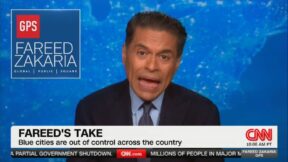Fox’s Brian Kilmeade Knocks Marco Rubio for Downplaying War Negotiations: ‘I Don’t Love That Tone’
Fox & Friends co-host Brian Kilmeade took a jab at Secretary of State — and newly-minted National Security Adviser — Marco Rubio on Friday, one day after he assumed the role following the departure of Mike Waltz.
Kilmeade began the segment by asking retired four-star General Jack Keane whether he believes Rubio can handle the new role on top of his other responsibilities.
“Well, yes, I mean, and it has a lot to do with the president,” Keane said, adding that Henry Kissinger also held both positions under President Richard Nixon.
Later in the segment, Kilmeade played a clip of Rubio listing his priorities on Sean Hannity’s show Thursday night, in which the Ukraine conflict appears to take a back seat.
Rubio said: “We have got so many — I would argue even more important issues going on around the world, not that a war in Ukraine is not important. But I would say what is happening with China is more important in the long term for the future of the world. Obviously, Iran’s nuclear ambition. You know, all these other things that we have going on. So, at some point in time, it either has to be something that can happen that we all need to move on. That’ll be a decision the president will have to make.”
“I don’t love that tone,” Kilmeade said of Rubio’s comments. “I want to find a resolve. Moving on, I just think it’s in our national interest to find a way — to do something.”
Read the full conversation here:
BRIAN KILMEADE: So Michael Waltz is out as National Security adviser. President Trump announcing yesterday he will be nominating Waltz to become the U.N. Ambassador. He will be in New York City. Taking his place for now, Secretary of State Marco Rubio. The last person to do both National Security adviser and secretary of state was Henry Kissinger. Can it work? Fox News senior strategic analyst retired four-star General Jack Keane joins us now. General, can you do both jobs?
KEANE: Well, yes. I mean, and it has a lot to do with the president. Richard Nixon appointed Henry Kissinger after Nixon won the election in ’68 as his National Security adviser and ’69. And then after the next election in ’72, William Rogers, who was secretary of state for the first term, was not asked to come back for the second term and he appointed Henry Kissinger as his secretary of state in ’73. But the reality is that Richard Nixon served 8 years as Eisenhower’s vice president and he was very much involved internationally during those years. And that, as such, he centered policy development and policy execution in the White House because he was almost daily involved in it with Henry Kissinger. And he never trusted the State Department. Many people in the state department — Henry Kissinger told me this himself — And he said, you know, the way the State Department acts is many of the people in the state department think they know more about foreign policy than the secretary of state. And that’s the reality of it. So power was definitely centered there most unusually to the degree he chose to do it. I mean, obviously the president is the center of foreign policy decisions — there’s no disputing that and that’s the case of the Trump administration for sure. But that was kind of the uniqueness of it. It only lasted from ’73 to ’75. Ford came in ’74 after Nixon resigned and kept it for one more year and then appointed a secretary of — then appointed another security adviser. So what is different, Kissinger was a National Security adviser first and then became secretary of state. Here, Marco Rubio is secretary taking on the NSA. I mean, it is tough to do both jobs. There’s no doubt — no doubt about that — but certainly Marco Rubio, I think, is very much up for that task.
KILMEADE: Yeah, they say Stephen Miller, Michael Anton and Ric Grenell are three people that have been mentioned for that job. So let’s talk about the historic nature of the U.S.-Ukraine mineral deal. Russia has weighed in on it. Says Trump has finally pressured the Kyiv regime to pay for our U.S.-aided mineral resources. Now, military supplies will have to be paid for with the national wealth of the disappearing nation. Really? So, that doesn’t sound like a country that’s looking for a way to — an off ramp to stop fighting.
KEANE: Well, I mean, this is really a blow to Putin. Because, everything he has been doing he has been trying to maneuver the Trump administration away from Ukraine as much as possible. And that’s part of his strategic ploy here and the narrative of his playbook that he has been executing. But this is significant. This is a generational relationship that the United States has signed into with Ukraine. Obviously, it’s economically based. But because of it is also politically based. And it has significant security implications. Look it, for that to succeed, there has to be stability and security in Ukraine. Or else there is not going to be much mining going on — there is a war going on. So there is implications here going forward for security as well. Yes. And that is a blow to Russia for certain. And no doubt the emotional response we’re getting from Putin is understandable from his perspective.
KILMEADE: So at some point, we have to decide what we’re going to do. Because Russia is not playing ball. The talk about sanctioning their central bank which has not been touched yet. And there’s more aid that Biden had left over that the Congress has already allocated. And now you could use equity in the deal to buy weapons from the Pentagon. Here’s Secretary of State Marco Rubio on what could be next.
MARCO RUBIO: We have got so many — I would argue even more important issues going on around the world, not that a war in Ukraine is not important. But I would say what is happening with China is more important in the long term for the future of the world. Obviously, Iran’s nuclear ambition. You know, all these other things that we have going on. So, at some point in time, it either has to be something that can happen that we all need to move on. That’ll be a decision the president will have to make.
KILMEADE: I don’t love that tone. I want to find a resolve. Moving on, I just think it’s in our national interest to find a way — to do something.
KEANE: Listen, the fact of the matter is that Putin, when you look at it, for 38 months, when you look at where the positions were. When he began the invasion in ’22. Thirty-eight months later, if you look at isw map comparing them, there is not that much difference. There has been some — yes, some small tactical gains been made across the entire Donbas region for sure. But, largely, nothing compared to what he wanted. Huge terrain operational gain. Not happened. In ’25, he’s got equipment problems and severe personnel problems. So, at the end of the day, I still believe Putin will come to the negotiating table, but he’s stalling to get as much concessions as he can out of Trump administration. What should we do? Upgun Ukraine with military assistance, not so they can fight a war indefinitely, but to force Putin to the table. Go with the sanctions crippling economic sanctions. This time the real thing oil, oil, oil. And central banks. Sen. Graham has got 70-plus senators lined up as well. Gotta take the gloves off here, I think.
KILMEADE: Absolutely.
KEANE: Force him into it. The idea that he is going to stay there and fight a protracted war for years to come and he’s eventually going to win is not true. That’s a false Russian narrative.
KILMEADE: Right.
KEANE: He has major, major problems.
KILMEADE: You know what? Make him pay the price for walking away. The status quo is not gonna work for us. That’s what I hope. Gen. Jack Keane, thanks so much. Be sure keep up with the institute’s study of war to get the absolute latest and most accurate Information. Thanks general, have a great weekend.
Watch above via Fox News
New: The Mediaite One-Sheet "Newsletter of Newsletters"
Your daily summary and analysis of what the many, many media newsletters are saying and reporting. Subscribe now!






Comments
↓ Scroll down for comments ↓